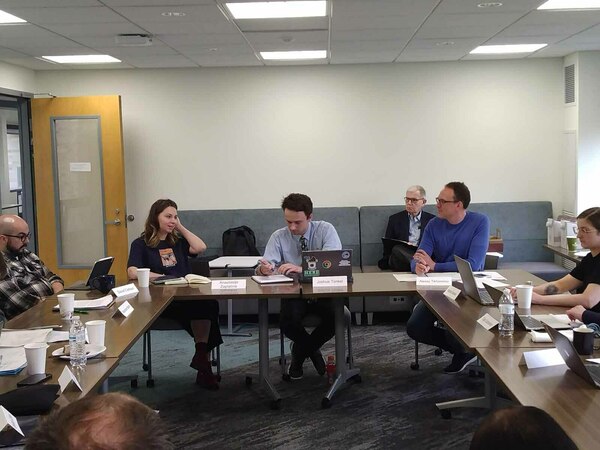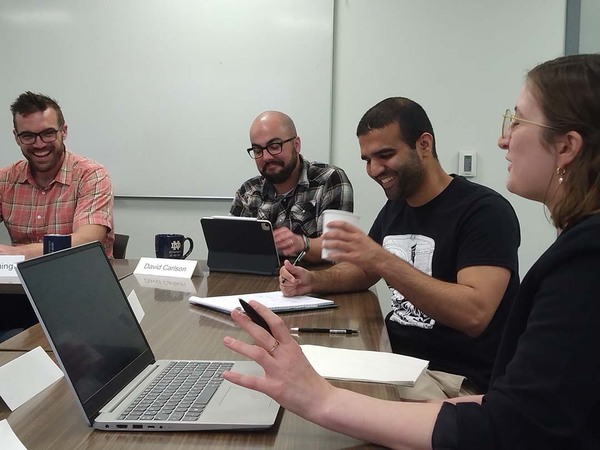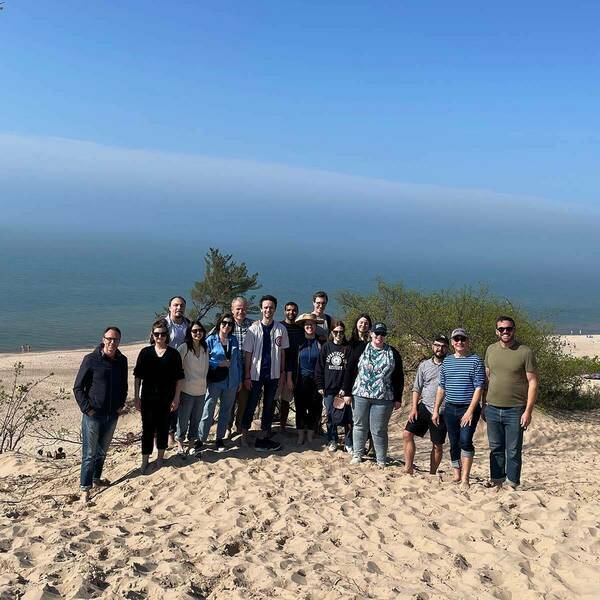
Continuing its legacy of international exchange, the University of Notre Dame-University of Bielefeld Transatlantic Workshop met again this May at Notre Dame. Over three days, graduate and faculty workshop participants discussed 18 diverse projects that touched on many places and historical times, from religion in 18th-century India to defense production in the Midwest up to the end of the Cold War. The presentation topics this year–sometimes global, sometimes the story of a single person’s journey–elicited provocative conversations about the nature of the historian’s craft and the variety of perspectives historians bring to their work. Thanks to generous funding from the Nanovic Institute for European Studies, Notre Dame students were able to welcome their counterparts from the University of Bielefeld to their campus and the Northern Indiana region. Alexander Martin, professor of history at the University of Notre Dame and Nanovic Institute faculty fellow, and Bettina Brandt, professor of history at the University of Bielefeld, coordinated the program this year. Also from Bielefeld University, Frank Grüner, professor of history, and Alexey Tikhomirov, assistant professor of history, led the German students during their Transatlantic voyage.
The annual Notre Dame-Bielefeld Transatlantic Workshop was inaugurated in 2010 under the leadership of Semion Lyandres, professor of history at the University of Notre Dame and Nanovic Institute faculty fellow—with each university pledging to alternately host visiting students from the other partner institution. For the first time since the beginning of the COVID-19 pandemic, Notre Dame hosted its counterparts from Bielefeld. The physical presence of guests on Notre Dame’s campus was an integral part of fostering ideas and friendship. This year’s workshop was a successful intellectual and cultural exchange.
The exchange experience

In keeping with tradition, the papers, which altogether ran to about 300 pages, were read in advance of the workshop. The days at Notre Dame focused on commentary and discussion in the spirit of camaraderie and assistance. The first challenge was writing a commentary on a topic that was sometimes distant from one’s own expertise. However, the different perspectives often opened up new viewpoints on the respective research projects, leading the discussion into unique territory, including numerous pointers to fascinating examples of research in diverse subdisciplines of history.
For the participants from Bielefeld, the language barrier was a far smaller obstacle than their jet lag. Yet, the students and faculty persevered, fueled by copious amounts of coffee and delectable pastries. In addition to the professional exchange, the discussions during the breaks also provided opportunities to talk about the differences in doctoral studies between the two programs. Here, some obvious parallels could be found in the distinct challenges of an academic lifestyle. From a German perspective, however, the Notre Dame campus and its curated summer foliage offered a strong contrast to the Bielefeld campus. A student concluded,
“Not only did I receive valuable reading recommendations during the presentation of my paper, but I was also able to gather many ideas for my dissertation project in conversations beyond the official program. The accommodation with a doctoral student gave me insights into American everyday life. The many conversations during coffee breaks and lunches allowed me to get to know the other participants well despite the limited time. See you soon in Bielefeld next year!”
Sharing the history and sights of the region

In addition to the daily schedule of the exchange, participants traveled to Chicago and the Indiana Dunes to understand Notre Dame’s connections with the broader Midwest. The trip started with a detailed lecture by Professor Alexander Martin on the history of Northern Indiana and its relationship to glaciers, rivers, and metalworking factories. In Chicago, participants explored the Loop and the Haymarket Memorial individually before reconvening for an extensive walking tour of downtown Chicago. The return trip included a stop at the Indiana Dunes to enjoy perhaps the most important geographical feature of the area, Lake Michigan itself.
Bridging the gap between theory and practice, workshop participants engaged in conversations about the purpose of history, its place in the present, and what role expert knowledge plays in changing our conceptual frameworks. Pairing workshop-style conversations with organic tête-à-têtes over meals at the South Dining Hall, banal everyday life blended with heady wrestling with concepts, often the purview of academic work. These conversations highlighted how simple details add up to something substantial: a story and history of people and the world in which they live.
The 2023 Notre Dame-Bielefeld Transatlantic Workshop successfully concluded on May 8. This year’s gathering continued the tradition of bringing scholars together from both sides of the Atlantic Ocean. With a diverse range of research interests, methodological approaches, and perspectives, the workshop allowed for lively and productive conversations that will continue in the months and years ahead. It was a great pleasure for the Notre Dame Department of History and the Nanovic Institute for European Studies to host their Bielefeld colleagues this year, and they look forward to continuing this collaboration next year in Germany.